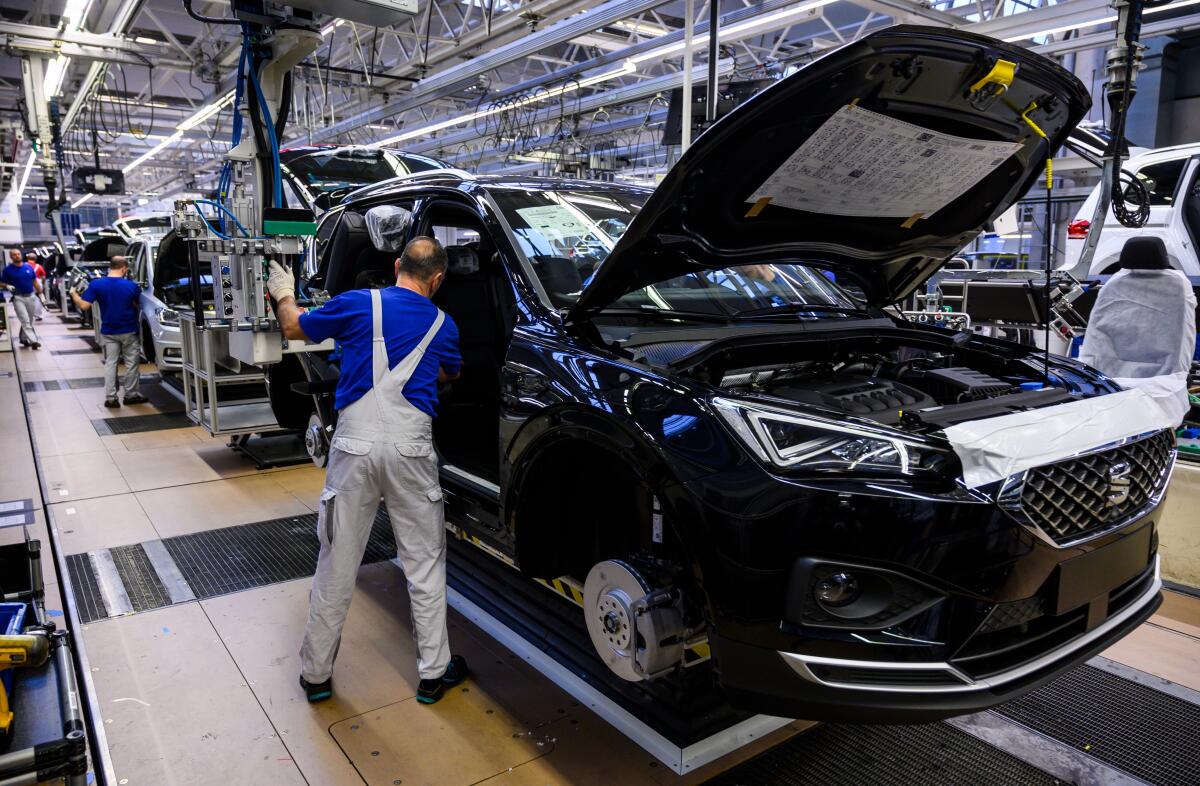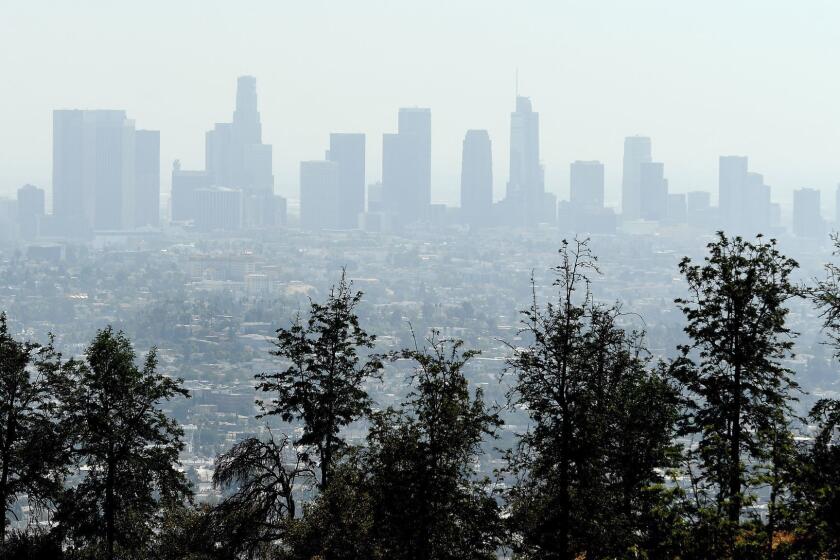California reaches climate deal with automakers, spurning Trump

- Share via
WASHINGTON — Four major automakers have reached a deal with California air regulators to gradually increase fuel efficiency standards, rejecting Trump administration efforts to relax tailpipe pollution regulations.
The agreement between the California Air Resources Board and the automakers — Ford, Honda, Volkswagen and BMW — covers about 30% of new cars and SUVs sold in the United States. It presents a direct challenge to the Trump administration’s plans, expected to be formally announced later this summer, to roll back tougher tailpipe pollution standards put in place under President Obama.
The fuel efficiency rules are key to reducing U.S. emissions of carbon dioxide and other gases that contribute to global warming. Cars, trucks and other forms of transportation are the biggest source of U.S. emissions, accounting for about 30% of the total.
The deal is a voluntary one, under which the companies are committing to produce a fleet of cars nationwide that would meet California’s higher standards, regardless of what the federal government does. The state would not have the legal authority to enforce that.
But the agreement marks a major strategic victory for California in its fight with the administration over tailpipe pollution and efforts to combat climate change because it splits the auto industry coalition that had begged for relief from fuel economy standards in the early days of the Trump administration.
California Air Resources Board Chairwoman Mary Nichols said the deal came together after more than a month of confidential negotiations in Sacramento.
In contacting state officials to open talks, the automakers defied warnings from the White House, Nichols said. Ultimately, she said, the four automakers concluded they “were better off striking a deal with California” than attempting to work with the administration.
Gov. Gavin Newsom said he was “very confident” that other automakers would join.
“Regardless of what the Trump administration determines in the next few weeks,” he said, “we’re moving forward.”
But the Environmental Protection Agency, which has spent more than a year working on new, more lenient standards with the National Highway Traffic Safety Administration, dismissed the agreement.
“This voluntary framework is a PR stunt that does nothing to further the one national standard that will provide certainty and relief for American consumers,” EPA spokesman Michael Abboud said in a statement.
The Trump administration has proposed freezing miles-per-gallon targets after 2020, a rollback that its own calculations show would increase daily gas consumption across the United States by about 500,000 barrels a day, worsening greenhouse gas emissions and contributing to the rise in global temperatures.
The war on smog has been called one of America’s greatest environmental successes.
Though the administration plan has been praised by oil and gas companies and groups that downplay or deny climate change, the prospect of years of legal battles with California and the costs of uncertainty made automakers increasingly fearful.
Under the agreement’s terms, California would ease requirements on automakers over the next few years.
Instead of producing cars that have to reach a minimum of about 50 mpg by 2025 — as the Obama-era standards called for — car manufacturers would have until 2026.
In addition, the year-over-year reductions would become easier for car companies to reach. Current regulations allow automakers to earn credits by selling electric vehicles. Under the new deal, they would have more latitude to spend these credits, using them to compensate for emissions targets they wouldn’t otherwise be able to meet.
In return for giving automakers more leeway, California would get a nationwide auto emissions program, at least as far as the four automakers are concerned. State regulators would also avoid what they have long considered a worst-case scenario: the Trump administration’s plans to lock existing fuel efficiency targets in place.
California regulators said their arrangement with automakers would result in at least a 30% reduction in greenhouse gas emissions compared with what would have happened if the U.S. auto market were split in two — with much of the country adopting the less stringent standards proposed by the Trump administration while California and 13 other states stick with tougher rules.
In a statement released Thursday morning, the automakers said the agreement would give them regulatory certainty by creating one standard that satisfied both federal and state regulations and “avoiding a patchwork of regulations.”
UCLA environmental law professor Ann Carlson called the deal a “huge step forward” because it would reduce greenhouse gas emissions while undermining arguments the administration had used to promote its policies. That includes the assertion that automakers can’t meet higher fuel efficiency standards.
“The deal doesn’t mean that the Trump administration will abandon its efforts to freeze auto standards and take away California’s permission to issue its own standards,” Carlson said. “But the settlement does make the administration’s case a lot weaker.”
Deborah A. Sivas, a professor of environmental law at Stanford University, said that “as we’ve seen in the past, California is kind of the 800-pound gorilla.”
“They are trying to keep with that strategy: Let’s make a deal with the nervous manufacturers that want to have some certainty.”
The deal elicited a range of responses from environmental advocates.
Some praised the agreement as the best way to preserve California’s unique authority to set stricter car pollution standards, which the administration has threatened to try to undo. Others worried that the state might have traded too much away.
“This announcement reaffirms the authority of California — and every other state — to set eminently achievable vehicle pollution standards that protect the public and curb carbon pollution,” said Luke Tonachel, director of clean vehicles and fuels at the Natural Resources Defense Council.
Sierra Club Executive Director Michael Brune said that “in the face of a total abdication of duties by the Trump administration, today’s announcement is a positive step forward.”
But Dan Becker, director of the Safe Climate Campaign and the Washington-based Center for Auto Safety, said the agreement would result in less than half of the greenhouse gas reductions automakers had agreed to under Obama.
“That means more pollution, less savings at the pump and a bad precedent for future standards,” he said.
Nichols said the deal started to come together in June after individual automakers contacted the state saying they wanted to sit down to forge an agreement. It was hammered out over about five weeks.
“This is a tremendous sign of the understanding and support of the auto industry for continued progress on meeting climate goals,” Nichols said, “and a recognition that the kind of approach that the Trump administration has taken would lead to a split within the country, would lead to worse results.”
Nichols said it was noteworthy that the deal included Ford, one of the Big Three automakers whose popular F-150 pickup is sometimes cited as an example of the type of big, gas-hungry vehicle Americans continued preferring over smaller, more efficient models.
“The Ford F-150 meets these standards, and Ford is not about to stop making and selling them,” Nichols said.
Talks between California and the White House broke down earlier this year, with each side accusing the other of being unwilling to negotiate.
Last month the White House rejected a plea from a group of 17 major automakers to restart the negotiations. The car companies warned the president that his administration’s plan to weaken the standards would hurt their bottom lines and could produce “untenable” instability.
The automakers’ voluntary pact with California follows a series of incremental steps the state has taken to work around the Trump administration and build a coalition of support behind retaining its tougher emissions standards.
In June, California signed an agreement with Canada pledging to work together to develop stricter emissions standards. And earlier this month, 23 governors, including some Republicans, joined together to support California leaders and oppose the Trump administration’s gas mileage plans. The coalition represented more than 50% of the U.S. auto market.
Times staff writer James Peltz in Los Angeles contributed to this report.
More to Read
Get the L.A. Times Politics newsletter
Deeply reported insights into legislation, politics and policy from Sacramento, Washington and beyond. In your inbox three times per week.
You may occasionally receive promotional content from the Los Angeles Times.













